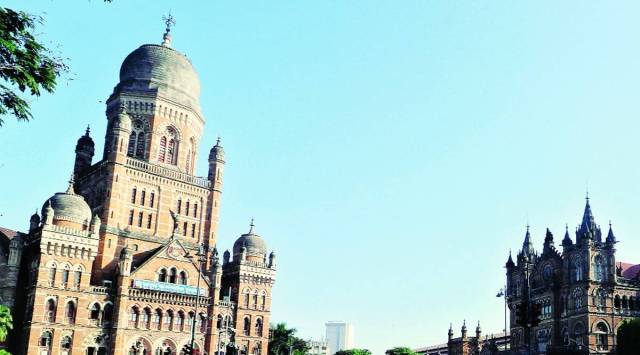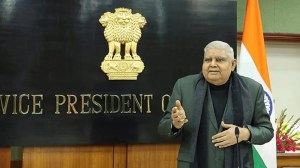BMC completes 18 months without corporators; no elected reps in 24 municipal bodies in state
This is the first time in the history of the state that almost all the civic bodies are without municipal corporators in place
 The Brihanmumbai Municipal Corporation is the largest civic body in the country. Express
The Brihanmumbai Municipal Corporation is the largest civic body in the country. Express On September 8, the BMC completed 18 months under an administrator’s rule, making it the longest tenure the civic body has remained without elected representatives in its 150-year-old history. In fact, BMC is not an exception and currently 24 out of the total 28 municipal corporations in the state do not have an elected body of public representatives and are being manned solely by state-appointed administrators.
This is the first time in the history of the state that almost all the civic bodies are without municipal corporators in place.
A municipal corporator bridges the gap between citizens and administration and is responsible for coordinating with the civic body for planning and implementing several civic works at the ward level including road repairs and constructions, pothole-filling, sewage work, public health, sanitation and water supply.
The elected corporators also get inducted into several statutory committees in a civic body, which include the standing committee, law committee, health committee, education committee, improvement’s committee, works committee and tree committee.
These committees play a crucial role in shaping the civic administration’s decision towards framing new policies and clearing proposals and resolutions related to development and building infrastructure of the city.
After the tenure of the corporators got over, their powers also ceased to exist, because under an administrator’s rule, the civic body is run by government officials and bureaucrats.
However, citizens continue to approach the former corporators for pointing out their problems related to several civic related issues.
While there is no sight of elections in the near future, some top officials in the Mumbai civic body also claim that the current top-down approach is costing them more time and manpower. Meanwhile, former corporators across political parties say that the absence of local representatives is leading to lack of coordination, redressal of local issues and delay in developmental works.
21 out of 24 municipal bodies sans corporators
Out of the 24 municipal bodies, five of them including Aurangabad, Navi Mumbai, Vasai-Virar, Kalyan Dombivali and Kolhapur have been under an administrator since 2020. In 2022, 18 municipal corporations including the Brihanmumbai Municipal Corporation (BMC), which is the largest civic body in the country, went under administrator’s rule.
This is also the second time since its foundation in 1873 that the BMC is being manned by a single administrator. Earlier, between March 1984 and April 1985, an administrator’s rule was imposed in the BMC during the erstwhile Congress regime. Elections were held later and the new council of elected representatives took oath in May, 1985.
Besides BMC, the municipal bodies at Nagpur, Solapur, Amravati, Akola, Nashik, Pimpri-Chinchwad, Pune, Ulhasnagar, Thane, Chandrapur, Parbhani, Latur, Bhiwandi, Malegaon, Panvel, Mira-Bhayander and Nanded went under administrator’s rule last year.
Besides this, in August 2023, the Sangli Miraj Kupwad Corporation became the latest body to go under an administrator’s rule, while the term of corporators in the municipal bodies of Jalgaon, Ahmednagar and Dhule will get over by the end of this year.
The five-year term of municipal corporators started to get dissolved starting April, 2020 since the civic elections could not take place on time due to the Supreme Court’s (SC) decision to scrap the Other Backward Classes (OBC) quota from local body elections. For the case in Mumbai, there was an additional issue of reorganization of the municipal ward boundaries which hindered the elections.
Post deferment of the elections, the then Maha Vikas Aghadi government appointed the incumbent municipal commissioners as the state-appointed administrator for manning the civic body in 21 corporations, whose term of elected representatives expired between April 2020 and July 2021.
For the corporations in which the term of corporators expired between October 2022 and August 2023, the administrators are being appointed by the current Shinde-Fadnavis government. BMC’s jurisdiction is bifurcated into 24 municipal wards which are being represented by 227 elected municipal corporators.
They are still the go-to persons for citizens
The former corporators said that even though their tenure has officially ended, yet the people continue to approach them with their problems. The corporators maintained that the government officials and bureaucrats including the ward officers and engineers aren’t easily approachable as the elected representatives. Therefore, they don’t have any other option but to bank on them to highlight civic issues.
Ravi Raja, former Congress corporator and Leader of Opposition (LoP) in BMC, said there is also a paucity of funds at the ward-level which hinders development works.
“Being ex-corporators, we are still attending to the grievances of the public and highlighting the civic issues with the ward officers. However, there is a laxity of funds. Earlier each corporator used to get a fund of nearly Rs 3 crore annually for carrying out development works in their wards. Now since there is no elected body, these funds aren’t allotted to us. Therefore, several development works remain unattended for a longer period of time, which earlier used to get solved within a few days,” Raja told Express.
“Earlier, we could ask the officials to arrange a meeting with us where we could address civic issues. But now we don’t have that authority, due to which several officials often take us for granted and take longer time than usual to attend to our problems,” Raja added.
Vinod Mishra, a former BJP corporator and group leader of the party in BMC said that earlier there used to be a smooth coordination between the administration and elected representatives, which is now largely missing.
“During our tenure, we could issue point-of-orders and there would be discussion towards framing policies and pending development projects in the house. As a result, everyone from the higher rank to the low rank officials would be aware of what is happening in each municipal ward. This in return would have helped the administration to understand the importance of certain issues and act on them immediately,” Mishra told Express.
Vishakha Raut from Shiv Sena (UBT), who was the former leader of the house in BMC, said that with the absence of elected representatives, the civic administration is working at the behest of the current state government.
“Currently, instructions laid out by the Urban Development department states that if corporators need to obtain funds, they must first write to the MLAs, who later approach the Guardian Minister, who eventually takes the appeal up with the administrator,” Raut alleged.
She added, “However, the Guardian Minister is from the ruling party. They do not allocate funds to the corporators from the opposition. We are being approached by people with their grievances. We can easily help them with issues such as making of birth certificates, death certificates and school or hospital admissions. However, in other concerns such as road works, building repairs, toilet repairs etc we are unable to do much owing to the lack of funds.”
Anil Kokil, another former corporator from Sena’s Thackeray faction, alleged that the BMC was allocating more funds to the corporators who are associated with the ruling party.
“More funds are being released in areas where the corporators are from the Shinde-Sena faction,” Kokil told Express.
“In the slum areas, there are many problems related to the setting up of storm water drains, creation of footpaths and even garden maintenance. There is a lack of speed breakers, zebra crossings and even street lighting or bus frequency. The problems are mounting as there is no one to hold the administration accountable now,” he said.
Residents and members from Advanced Locality Management (ALM) groups maintained that most of the ward-level problems have increased in the absence of corporators.
“When earlier, even on a small issue starting from water leakage to even garbage collection, one could approach the corporator. Now, most of the people don’t know which BMC officials or department to approach when they want to raise a complaint. There is a growing sense of helplessness among people”, Rajkumar Sharma, trustee and founder of Advanced Locality Management Networking Action Committee (ALMNAC), told The Express.
He added that even as the ward level officers have been given good support to ALM’s complaints, lack of funds has led to many problems. “One of the major issues in our ward pertains to management of open spaces and encroachment. Even though the encroachment of hawkers has always been an issue, the problem is mounting now,” Sharma said.
Faiyaz Shaikh of Govandi Citizen Welfare Forum said many local residents are still not aware that the tenure of corporators is over and therefore, directly approach them with the issues that they face.
“However, it isn’t as easy to get in touch with the ward officers. When we approach the ward officer during the weekly public grievance hearing hours, often it is found that they are engaged in another meeting. There is a big gap in dialoguing. In our ward, the assistant municipal commissioner hardly ever goes on ground or conducts surveys of her own ward,” Shaikh told Express.
Dhaval Shah, co-founder of Lokhandwala Oshiwara Citizen’s Association (LOCA) said that with the corporator’s term getting over, there is nobody to push the administration for completing pending infrastructure projects.
“In the entire Andheri area, there are multiple infrastructure projects that are pending for many years, including the Gokhale Bridge extension, the Yari Road to Lokhandwala Bridge, the extension of Balasaheb Thackeray Flyover and Madh-Versova bridge. The corporators would take up regular follow-up of the progress of these projects by sending letters to the administration and visiting the departments. Now that their terms are over, there is hardly any follow-up to push these issues,” Shah told Express.
Keeping the admin accountable
V Ranganathan, a retired IAS officer, who served as the municipal commissioner in 2000, said elected representatives play a key role in keeping the administration accountable for maintaining its decision.
“All the BMC departments are answerable to the various statutory committees regarding the administrative decisions. These departments give suggestions and objections related to several civic works and development projects and also monitor the progress and financial expenditures as well. Therefore, if these committees cease to exist, then the rate of accountability gets reduced,” Ranganathan told Express.
He also said that the absence of corporators in the civic body weakens democracy.
“The elected representatives reflect their constituency. These corporators raise issues and propose projects to the administration based on the citizen’s requirement at the local level. The corporators also play a key role in giving suggestions and objections and often take a critical approach towards the policies as well. Now in their absence, it also becomes difficult for the civic administration to keep continuous track of the ground reality,” Ranganathan said.
DM Sukhtankar, a retired IAS officer, who was the first administrator to run BMC between March and November in 1984, states that the current situation is comparatively different to what it was in 1984.
“In 1984, it was a political move to impose administrator’s rule in the BMC. The five-year term of the corporators was about to expire and the then CM imposed administrator’s rule at the behest of the president of the Pradesh Congress Committee, who felt his party would not be able to win the immediate elections and would require some more time to strategize their political moves. However, this time the administrator’s rule was imposed due to non-completion of formalities like ward delimitation,” Sukhtankar told the Indian Express.
“However, the local elections need to be announced soon as it is unhealthy for a civic body like BMC to run without corporators in a democratic set-up,” he said.
Interference from state government
Surendra Jondhale, a political analyst and observer, said that since the administrator is directly under the control of the state government, there are possibilities of frequent interference from the ruling party that is currently in power in the state.
“Imposing an administrator’s rule for so long clearly shows bureaucratisation of the democracy. The local bodies are meant to connect to the people at the grassroot level, and not having elected representatives just increases the communication gap between the administration and people,” Jondhale told The Indian Express.
Earlier, when the terms of corporators would be in effect, civic officials were compelled to meet a representative at any cost. However, at present, a dialogue with people is the choice of the bureaucrats, according to Jondhale.
“If there would have been an elected body inside a municipal corporation, then the state government wouldn’t be able to influence its affairs since there would be a Mayor as well as a separate body of Opposition leaders. This would make the body’s affairs autonomous. However, in the absence of the corporators, the civic bodies are being indirectly controlled by the government as the administrators are expected to follow the orders and guidelines,” Jondhale said.












